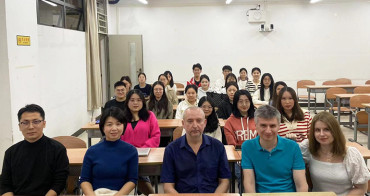 Guangdong University of Foreign Languages and International Trade (GUILIT) hosted a lecture series titled Prospects for Research in Computational Linguistics in Russia, on December 6-9. The lectures were delivered by professor M. Mukhin, Head of the Department of Fundamental and Applied Linguistics and Textual Studies at Boris Yeltsin Ural Federal University. The audience included D. Sharafutdinov, the Russian expert of GUIA&MT, as well as teachers, doctoral, and master's students from the Department of Russian Studies.
Guangdong University of Foreign Languages and International Trade (GUILIT) hosted a lecture series titled Prospects for Research in Computational Linguistics in Russia, on December 6-9. The lectures were delivered by professor M. Mukhin, Head of the Department of Fundamental and Applied Linguistics and Textual Studies at Boris Yeltsin Ural Federal University. The audience included D. Sharafutdinov, the Russian expert of GUIA&MT, as well as teachers, doctoral, and master's students from the Department of Russian Studies. What is a Russkiy Mir Cabinet?
/ Главная / Russkiy Mir Foundation / Russian centers / What is a Russkiy Mir Cabinet?Russkiy Mir Cabinet
The Foundation’s Russkiy Mir Cabinet program is aimed at creating conditions conducive to the study of Russian language as well as increasing knowledge and understanding of Russian culture and the realities of contemporary Russia.
Objectives of the Russkiy Mir Cabinet Program:
-
Promotion of Russian culture and Russian language as a global language;
-
Informational support for compatriots abroad as well as foreign citizens interested in Russia.
How the Program Works
The Foundation supports the creation of Russkiy Mir Cabinets via the provision of a contract-based donation to the hosting organization. This process begins with an official request form the potential host organization to the Foundation, indicating the materials requested for the formation of the Russkiy Mir Cabinet. If the Foundation approves the organization’s request, the two parties sign a donation agreement, which specifies in detail the materials to be provided by the Foundation free of charge. In turn, the host organization is obliged to use the materials for educational purposes with the aim of popularizing the Russian language and supporting intercultural dialog.
Russian Centers News
 Guangdong University of Foreign Languages and International Trade (GUILIT) hosted a lecture series titled Prospects for Research in Computational Linguistics in Russia, on December 6-9. The lectures were delivered by professor M. Mukhin, Head of the Department of Fundamental and Applied Linguistics and Textual Studies at Boris Yeltsin Ural Federal University. The audience included D. Sharafutdinov, the Russian expert of GUIA&MT, as well as teachers, doctoral, and master's students from the Department of Russian Studies.
Guangdong University of Foreign Languages and International Trade (GUILIT) hosted a lecture series titled Prospects for Research in Computational Linguistics in Russia, on December 6-9. The lectures were delivered by professor M. Mukhin, Head of the Department of Fundamental and Applied Linguistics and Textual Studies at Boris Yeltsin Ural Federal University. The audience included D. Sharafutdinov, the Russian expert of GUIA&MT, as well as teachers, doctoral, and master's students from the Department of Russian Studies. 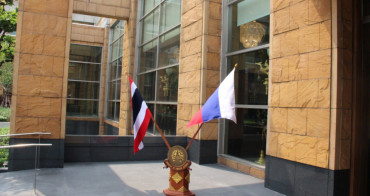 Russian cultural center is planned to be launched in Thailand, TASS reports. Russian Ambassador Evgeny Tomikhin shared that preparations are underway to sign a corresponding agreement between the governments of the two countries. He explained that the Russian and Thai MAF representatives discussed this topic during a meeting on the sidelines of the UN General Assembly.
Russian cultural center is planned to be launched in Thailand, TASS reports. Russian Ambassador Evgeny Tomikhin shared that preparations are underway to sign a corresponding agreement between the governments of the two countries. He explained that the Russian and Thai MAF representatives discussed this topic during a meeting on the sidelines of the UN General Assembly. 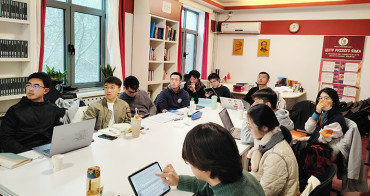 Russian Center of Beijing Foreign Studies University hosted a student Russian-Chinese cooperation in various fields forum on December 12. It was attended by the head of the PUIA Russian Center, Director of the Russian Language Institute Professor Dai Guijiu and Russian language students.
Russian Center of Beijing Foreign Studies University hosted a student Russian-Chinese cooperation in various fields forum on December 12. It was attended by the head of the PUIA Russian Center, Director of the Russian Language Institute Professor Dai Guijiu and Russian language students. 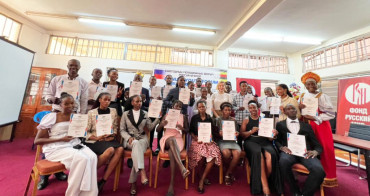 The first Russia-Uganda Youth Forum was held in Kampala. The forum featured presentations from youth organizations, including representatives from the Federal Agency Rosmolodezh.
The first Russia-Uganda Youth Forum was held in Kampala. The forum featured presentations from youth organizations, including representatives from the Federal Agency Rosmolodezh. 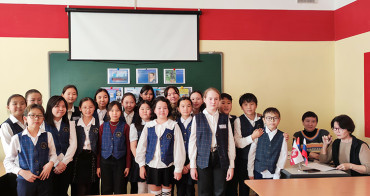 The Russian Center of the Ulaanbaatar branch of Plekhanov Russian Economic University hosted a recitation contest dedicated to the best performance of poetic works by F. I. Tyutchev on December 8.
The Russian Center of the Ulaanbaatar branch of Plekhanov Russian Economic University hosted a recitation contest dedicated to the best performance of poetic works by F. I. Tyutchev on December 8. Russian center opened in Uzbekistan 07.12.2023
The Russian Center of Namangan State Institute of Languages was opened on December 7. A delegation of the Russkiy Mir Foundation headed by its executive director Vladimir Kochin took part in the ceremony. 
New Year's master class held in Bratislava 06.12.2023
The European Foundation for Slavic Letters and Culture in Bratislava hosted a master class "Drawing a Christmas tree toy" for primary and middle school students using the gouache painting technique on December 3. 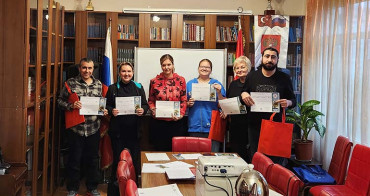 The Russian Center of the Russian Society for Education, Cultural and Business Cooperation in Istanbul joined Geographical Dictation international educational campaign.
The Russian Center of the Russian Society for Education, Cultural and Business Cooperation in Istanbul joined Geographical Dictation international educational campaign.